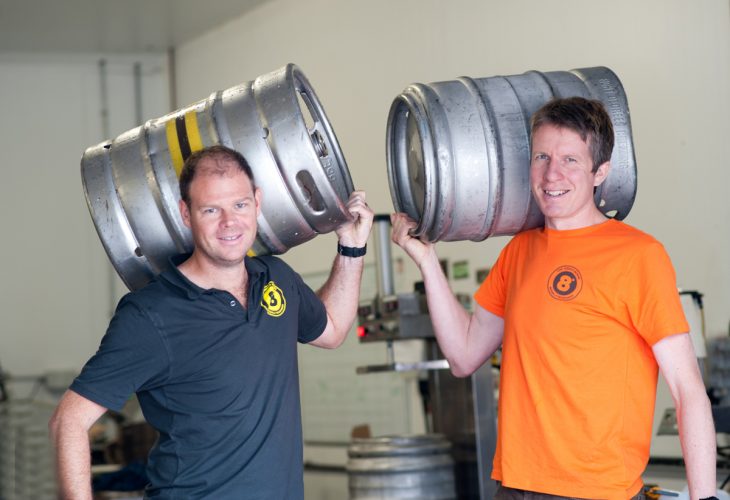Better Business checks the pulse of the craft brewing industry in Ireland and chats to four brewers proving that size doesn’t always matter.
Walk into most off-licences these days and chances are you’ll come across a new brand of beer produced by one of the many independent breweries now operating across the country. And it’s no wonder when you look at the stats. According to research carried out for the Independent Craft Brewers of Ireland and Bord Bia, it is estimated that there were some 90 microbreweries operating in the Republic of Ireland in 2016, a number that has more than quadrupled since 2012.
While the figures show that the craft beer revolution – as it has been hailed – is still in full flow, how long before we reach saturation point? Is there still room for more small players? Can we expect to see consolidation in the market and how are the craft brewers here really getting on?
According to Jonathan McDade, Head of the Irish Brewers Association (IBA), an organisation within Ibec which represents Ireland’s major brewers and beer distributors, the craft beer market in Ireland is in a healthy state. Published in August, the association’s latest Beer Market Report shows that the market share of craft beer in Ireland is estimated to have been 3.4 per cent in 2016, which represents almost a threefold increase in market share since 2014. “It’s quite impressive,” says McDade. “I do expect the market share of craft beer to continue growing but probably not at as dramatically as it has done in recent years. Production output for 2016 did not meet projected estimates while beer consumption in Ireland over the past few years has flat-lined after more than a decade of beer consumption declining.”
The prospect of beer consumption declining again in the future is not the only issue that smaller breweries have to grapple with. McDade cites upskilling workforce, distribution obstacles and general route-to-market issues as other challenges they face. Perhaps an even more pressing issue, which hasn’t garnered too much attention regarding the impact it could have on small brewers, is the Public Health (Alcohol) Bill. The bill is proposing stringent placement and content restrictions on advertising, the introduction of an “Irish-only” label and visual segregation of alcohol in all retail outlets.
“The proposals on labelling will make it more challenging for micro breweries to absorb the additional costs of producing one label for export, and another exclusively for the domestic market,” warns McDade. “The proposed ‘beer curtains’ for retail outlets will see less established craft beer brands out of sight from the browsing consumer on the shopfloor. The structural seperation in retail outlets and the proposed advertising restrictions will effectively provide a market advantage to the more established beer brands.”
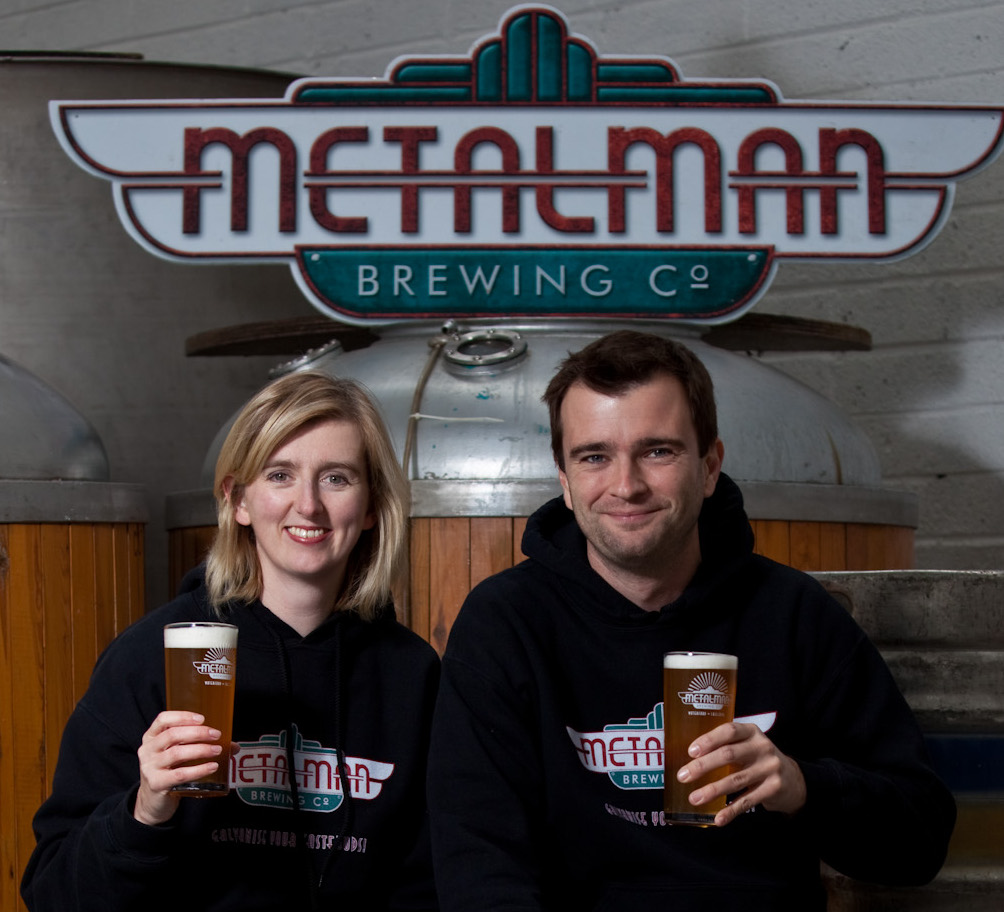
Gráinne Walsh and Tim Barber, founders of Metalman
Message In A Bottle
As it stands, without the introduction of draconian measures such as so-called ‘beer curtains’, small brewers already face the challenge of getting the word out there about their products, something that Gráinne Walsh, founder of Waterford-based Metalman Brewing, is all too aware of.
“In a world of constant communication, it can be very challenging for us to get our message across,” she says. “We are rather scarce on resources – which means we are rather scarce on power and money! – so we have to shout very loud to be heard above everything else. As indie brewers, the best approach we can take is to come together with a united voice – we have more strength when we act together.”
Walsh points to two important legislative changes that were implemented in recent years as a result of pressure placed on the Government by independent brewers acting in unison. Increasing the production cap that defines an independent brewer to promote growth in the industry was one, while changes to the way excise duty is collected from microbrewers in order to help them with cashflow was another. Most recently, the Government approved legislation that will allow independent brewers to sell beer to brewery visitors – something that they are currently prohibited from doing. Walsh says it will be a significant win for the independent drinks community when this legislation is passed into law.
Indeed, it was by visiting breweries abroad with her husband Tim and sampling beers that prompted them to leave their corporate jobs and set up Metalman in 2011. So being able to tap into the potential that beer tourism offers is clearly a matter close to Walsh’s heart. “Having run an operating brewery for the last six years, I can genuinely say that it is really frustrating to have enthusiastic beer drinkers turn up at your door wanting to buy your beer, only to have to turn them away and say ‘sorry, we’re not allowed sell beer’. It’s also really embarrassing when you see the look on their faces as they try to puzzle out why a brewery would not be allowed to sell beer! I really believe that introducing this legislation will encourage fantastic growth in the independent drinks industry, as well as in local tourism around the country in general.”
Overall Walsh admits that is a very challenging market to compete in due to the size and strength of some competitors, but she is hopeful that the industry here will continue to grow. “Growth in independent beer is driven by consumer demand, and by retailers who support that demand, who are happy for a bit of a disruption to the status quo that we’ve had in the market for the last few years,” she notes. “As long as we can continue the momentum in this way, I think independent Irish beer will continue to flourish.”
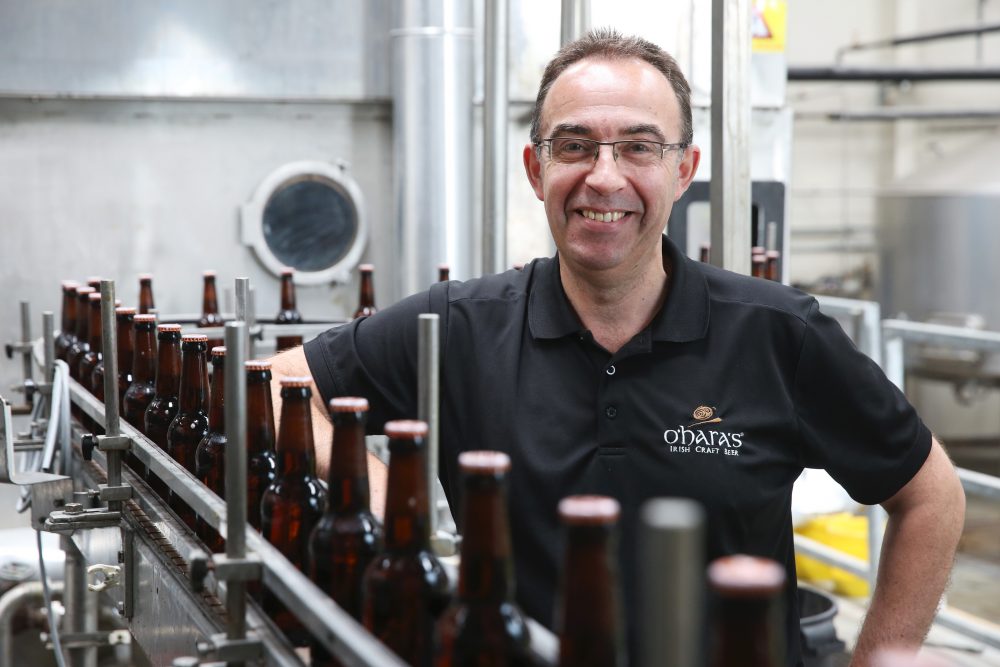
Seamus O’Hara, Carlow Brewing Company
Crafty Tactics
One complaint you’ll regularly hear within craft brewing or consuming circles is the way in which major beer producers have responded to the market disruption caused by independent brewers. Since Molson Coors acquired Cork brewers Franciscan Well in 2013, we haven’t seen much movement by large breweries in Ireland to take over the small independent ones. Rather than further market consolidation, instead we have seen a move by the big players to offer a wider selection of beers to the Irish consumer, often marketed or labelled as the kind of products produced by a microbrewery – a move that the uninformed consumer might not be privy to.
It’s seen by some of the legitimate craft brewers as underhand tactics, while others like Seamus O’Hara, founder and Managing Director of Carlow Brewing Company and one of the industry’s most recognisable pioneers, consider it to be an indication that the independent brewers are doing something right. “It’s a bit frustrating and certainly it can cause confusion in the market,” he says. “On one level it frustrates me a bit. On the other hand, it’s a sign that the craft beer sector, which has been a fledgling new sector, is a success and that we are starting to achieve some scale and momentum.”
According to O’Hara, the business model of big breweries is not about disrupting the market and having a diverse range of beer. However, if they are willing to fragment the market with new offerings, it creates more opportunity for the independent producer. “Craft companies are more nimble and are able to be creative and responsive to the change in consumer demand that comes off the back of that,” he says. “The underhanded stuff is what frustrates all of us. But business is business and if they want to help us disrupt and fragment the market, that’s the sector we’re in so we’ll soldier on.”
A family business established back in 1996, the Carlow Brewing Company is doing more than soldiering on. This year has been a significant one for the brewer, having acquired a new cider brand with the takeover of Craigies Cider. O’Hara also sold a stake in the company to Spanish brewers Hijos de Rivera and has announced plans for a new brew pub in Dublin’s CHQ building. So what will the partnership with Hijos de Rivera mean for business?
“They had been acting as our importer in Spain for a couple of years so we got to know them well,” O’Hara explains. “The significance for us is having their backing in terms of trying to develop and grow our business. You need that financial backing as you grow. It’s a strategic investment which brings with it a knowledge of the beer industry and potential international reach… It was a company that we found, a family-owned business just over 100 years old, and it was a really good cultural fit for us.”
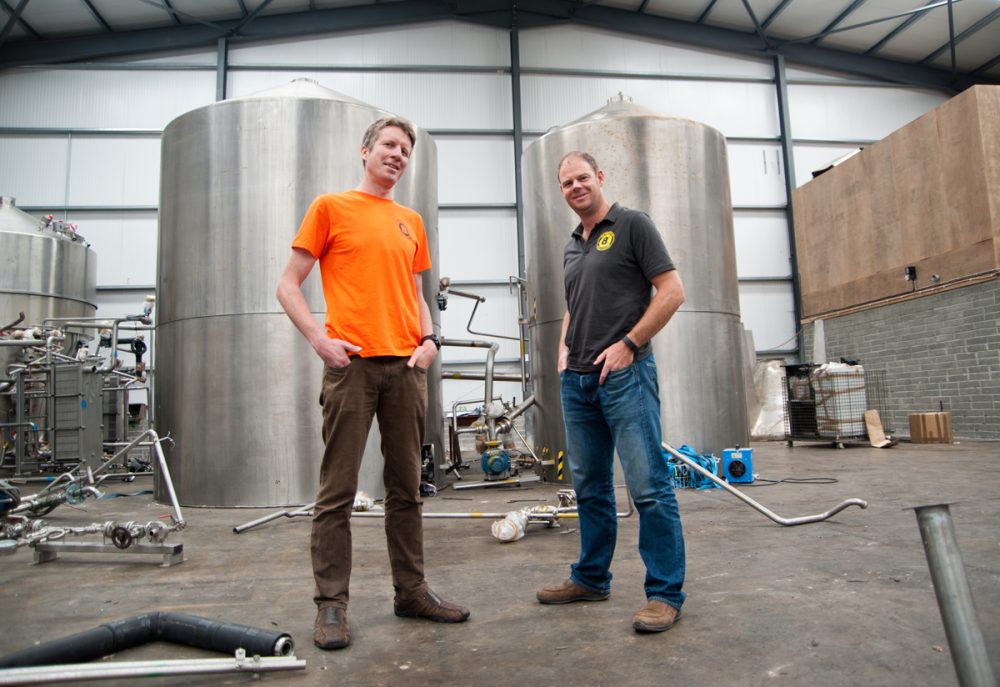
Scott Baigent and Cameron Wallace of Eight Degrees Brewing
Beers With Atmosphere
One brewer our readers might be familiar with having seen their red ales and pale ales readily available at SFA events is Eight Degrees Brewing. Born out of a recognition that despite having a great pub culture, the beers on offer in Ireland back in 2010 didn’t match the atmosphere, Cork-based Eight Degrees Brewing was set up by Australian Cameron Wallace and New Zealander Scott Baigent. As Wallace tells it: “We rustled up some cash and investment, went to Berlin to study the microbiology of brewing at the VLB institute, and we jumped in with both feet.”
Wallace echoes Walsh’s sentiment that marketing poses the biggest challenge for small brewers – or simply put, getting people to try the beer. “Once they taste it, more often than not they are hooked,” he says. “It’s like a completely new mindset, so often I hear the comment, ‘but I didn’t know beer could taste like this’. Getting them to try it is always the biggest obstacle. Craft or micro-produced beer is about giving the consumer a wider choice, and something different. This philosophy encourages consumers to be promiscuous, so we can’t expect loyalty always.”
According to Wallace, craft brewers are facing a David versus Goliath battle when it comes to competing with the larger breweries and, again, references some of the unsavoury tactics being taken to ensure that the smaller players are not gaining too much of a stake in the market. “The big boys are flexing their muscle at the moment and being very aggressive especially on the draught side of things, making it extremely difficult for microbreweries to get a tap anywhere,” he explains. “But we are tenacious, our small stature makes us nimble, we can adapt quickly to changing consumer preference. We, as an industry are focused even more so on quality, because we know marketing budgets and bully tactics will not prevail in the long-term.”
So Eight Degrees Brewing seem up for the challenge, and it helps when they have a multitude of other craft brewers on their side. It’s something that’s noticeable at any craft beer event you attend, including the annual Irish Craft Beer Festival; there is great camaraderie between those operating in the industry.
“Camaraderie is very important,” says Wallace. “Together we can achieve so much more and really build a sustainable industry with market shares approaching five or even 10 per cent in the coming years. A good example is the Hagstravaganza festival in Sligo where over 20 breweries locally and internationally share ideas and collaborate over a beer or two. It’s inspiring and fun and reminds us of the reason why we got into this industry in the first place.”
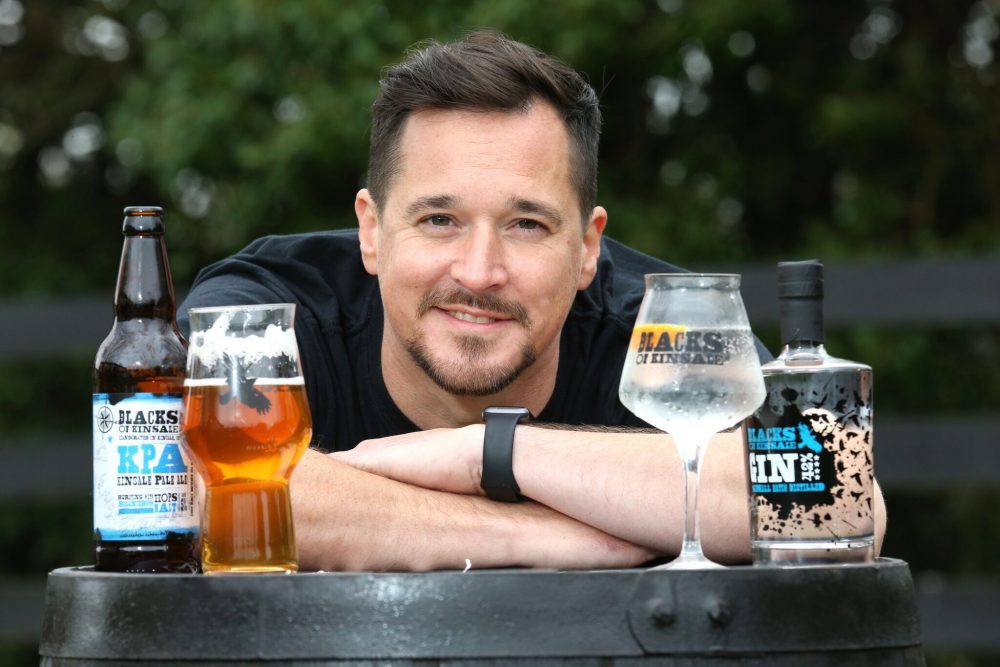
Sam Black, Blacks Brewery & Distillery
New Arrivals
One of the more recent arrivals to the craft beer market, but which has already made its mark with its attractive labelling and flavoursome beers, is Blacks Brewery & Distillery in Kinsale. Established in 2013 by husband and wife team Maudeline and Sam Black, the couple’s love of brewing came about when Maudeline purchased a homebrewing kit for Sam as a St. Valentine’s Day gift. As Maudeline says, they’ve been living the dream ever since.
So having been one of the later entrants into the market, does Maudeline Black believe they crept in just in time before the market became overcrowded? “Are we reaching saturation point? I think we probably are,” she says. “There is one brewery for every 47,000 people in Ireland currently, which is more breweries per head of capita than in the US, which most people would consider to be at saturation point.”
One advantage Blacks has over other new entrants is that in 2015, the company began producing spirits, including poitín and gin. According to Black, they were the first co-located brewery/distillery in the country and are now focused on growing the distillery side of the business. It’s no surprise then, that like other craft brewers, Black sees great opportunities down the track through the Craft Brewers and Distillers Bill.
“It will certainly help Blacks’ cause,” Sam Black says. “The bill has good potential for us as we are uniquely placed having both a distillery and a brewery on one site, coupled with being in Kinsale, a major tourist destination town. Hopefully we will have some solid idea of what it entails and how to make the best of it for the tourist season in 2018.”
The new legislation would certainly be more armour for the small producer in competing with the big guys, something Black has found to be a challenge to date. “With the rapidly growing number of craft breweries and also the larger macro breweries launching an increasing amount of ‘crafty’ beers, it’s hard to find shelf space for all of your desired range of output,” says Maudeline. “We love brewing different styles of beer and last year we had six brand new beers launching in bottle, but this year we have only launched new products on draught-only release.”
So is there anything else the Government could be doing to give craft brewers in Ireland the extra leg up they need? According to the IBA, it could start by reducing the excise burden in Budget 2018. Excise in Ireland has gone up 42 per cent in the past six years and Ireland has the second highest excise on beer in the EU as well as the most expensive alcohol. We’ll have to wait until October to see if it’s part of the Government’s plans.
One thing that is not in doubt is Ireland’s love affair with beer. According to IBA’s Beer Market Report, it remains the country’s most popular alcoholic drink, with a 46.2 per cent market share. Now, with a wide varierty of innovative products bursting with all sorts of flavours on their side, craft brewers intend to fight their corner and grab a larger slice of the pie. Afterall, in a country which ranks sixth in Europe when it comes to beer consumption, there is room for both big and small producers to co-exist in the market.
As Walsh of Metalman puts it: “It’s like the food industry – sure, there’s a place for global fast food joints, but that’s not what everyone wants, all the time. We still want small independent cafés, Michelin-starred restaurants, family-owned pizzerias, ethnic cuisine. Essentially, as consumers, we want variety, and we want to be the ones who choose what we consume. In Ireland we’re farther along in terms of choice in the food industry than we are in the beer industry, but we’ll get there eventually.”


